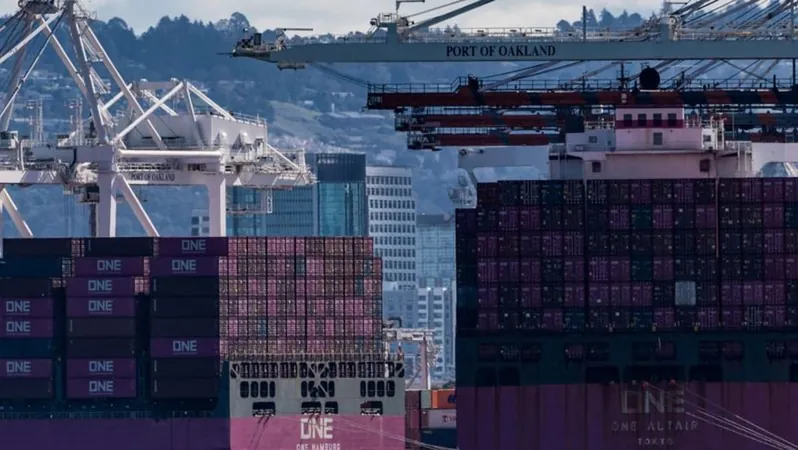
Global Trade on Edge as Trump Confirms New Tariffs: What You Need to Know
2025-04-01
Author: Yu
Global Trade on Edge as Trump Confirms New Tariffs: What You Need to Know
WASHINGTON, D.C. — In a move that has sent shockwaves through the global economy, the White House officially announced that President Donald Trump will impose new tariffs starting on Wednesday, April 2nd. Although specific details regarding the extent of these trade barriers remain scarce, businesses, consumers, and investors are bracing for a potential escalation of the ongoing trade war.
Trump has hailed April 2nd as a "Liberation Day," expecting new tariffs that could radically alter the world’s trading landscape. A significant announcement is set for 4 PM Eastern Time, during which the White House will disclose how these tariffs will unfold.
White House spokesperson Karoline Leavitt confirmed that reciprocal tariffs on nations imposing duties against U.S. goods would take effect immediately following the announcement. Additionally, a hefty 25% tariff on auto imports is expected to kick in on April 3rd.
This upcoming tariff is not a standalone effort. Trump previously placed tariffs on aluminum and steel imports and raised duties on all goods from China, though he has also threatened to impose various tariffs only to retract or delay them at the last moment. However, this time, Leavitt's strong comments suggest a determination to move forward without retreat. "The president has a brilliant team of advisors who have been studying these issues for decades, and we are focused on restoring the golden age of America," she stated during a press briefing.
According to sources, the White House is contemplating a sweeping approach that could see duties increase by around 20% on products from nearly every country, rather than singling out specific nations or products. Some analysts suggest that the new tariffs could generate upwards of $6 trillion in revenue for the U.S., potentially translating into rebates for American citizens, though such plans are speculative at this stage.
Canada's Prime Minister Mark Carney has already expressed strong opposition, pledging to enact retaliatory tariffs. "We will not disadvantage Canadian producers and Canadian workers relative to American workers," he asserted in Winnipeg, highlighting the potential for a fierce trade backlash. Reports suggest that U.S. companies are encountering a "Buy Canadian" movement, making it increasingly challenging to get their products onto Canadian store shelves.
Compounding the uncertainty, numerous countries are preparing countermeasures while simultaneously attempting to negotiate deals with the Trump administration to avert these tariffs. As of now, it remains unclear whether these diplomatic efforts will be successful.
Critics of Trump's strategy caution that hefty tariffs will likely lead to increased consumer prices, both domestically and globally, thereby impacting economic growth. A recent study from Yale University warns that the additional tariffs could ultimately cost U.S. households at least $3,400 annually.
American factories and firms have already begun to feel the strain of uncertainty associated with Trump's policies. Surveys indicate a drop in business and consumer confidence, with many fearing that the tariffs will not only spur inflation but will also detrimentally affect economic growth. Since mid-February, the U.S. stock market has plummeted, losing nearly $5 trillion in value, with investor sentiment taking a significant hit.
The ramifications extend globally, as manufacturing activity has contracted in various countries, including Japan and the U.K., as businesses prepare for the anticipated tariffs. While some companies rushed to stockpile goods before the tariffs take effect, economists warn that any short-term boost in activity could soon flip to a broader economic drag.
Economist Julian Evans-Pritchard of Capital Economics emphasized that the long-term effects of these tariffs might be more detrimental than beneficial, saying, "It won't be long before U.S. tariffs turn from being a tailwind to being a drag."
As the world awaits Trump's announcement and subsequent actions, all eyes are on global markets and trade relationships poised on the brink of significant change. Will the U.S. emerge as a leader or risk isolating itself in a fractured global trade environment? Only time will tell.


 Brasil (PT)
Brasil (PT)
 Canada (EN)
Canada (EN)
 Chile (ES)
Chile (ES)
 Česko (CS)
Česko (CS)
 대한민국 (KO)
대한민국 (KO)
 España (ES)
España (ES)
 France (FR)
France (FR)
 Hong Kong (EN)
Hong Kong (EN)
 Italia (IT)
Italia (IT)
 日本 (JA)
日本 (JA)
 Magyarország (HU)
Magyarország (HU)
 Norge (NO)
Norge (NO)
 Polska (PL)
Polska (PL)
 Schweiz (DE)
Schweiz (DE)
 Singapore (EN)
Singapore (EN)
 Sverige (SV)
Sverige (SV)
 Suomi (FI)
Suomi (FI)
 Türkiye (TR)
Türkiye (TR)
 الإمارات العربية المتحدة (AR)
الإمارات العربية المتحدة (AR)